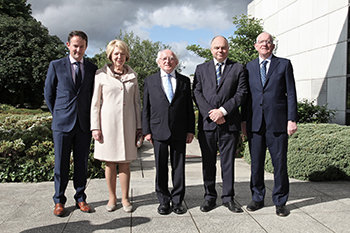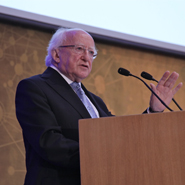Posted 02 July 2015
President Michael D. Higgins urges leadership and commitment to spirit of Universal Declaration of Human Rights on migration and conflict issues
“We are at a critical moment in world history; facing a series of tests and choices that will determine not only the fate of millions of our fellow global citizens now, but tests and choices that will define the future of our planet.”
Those remarks formed part of President Michael D. Higgins opening address to the Irish Humanitarian Summit, held in UCD’s O’Reilly Hall, in which he cautioned against “ceding to a historical and statist exceptionalism” whereby “we might lose sight of, or even lose completely, the universality of human rights and human dignity on which our international order is expressed.”
Jointly hosted by the Irish Government and UCD’s Centre for Humanitarian Action, the summit brought together members of the Irish and international NGO community, academia, the private sector, diaspora networks, the UN, and the Irish government.

Pictured at the Irish Humanitarian Summit: Sean Sherlock TD, Minister of State; Sabina Higgins; Michael D. Higgins, President of Ireland; Prof Andrew Deeks, President of University College Dublin; Charlie Flanagan TD, Minister for Foreign Affairs and Trade
Its purpose was to discuss recommendations put forward by the Irish consultative process of the wider World Humanitarian Summit, due to be held in Istanbul in May 2016, and which aims to “set a new agenda for global humanitarian action.”
Throughout his speech, President Higgins referenced Ireland’s “history of humanitarian engagement” which he believed “has become strongly linked to the positive aspects of Irish national identity.”
He stated how the legacy of Ireland’s forebearers “provided our country with a specific ethical, and emancipatory, perspective on world affairs.”
The contemporary result of this was an outward approach based upon “values of solidarity, community, democracy, justice, freedom, and respect for human rights and equality,” values which he believed must be invoked to address ongoing humanitarian issues.
Claiming that the international response to ongoing migration crises in the Mediterranean and elsewhere had, so far, been “wholly inadequate”, President Higgins argued that, in order to correct this, the world would “need political and moral leadership that is courageous and far-sighted and grounded in the founding values of human rights.”
Given Ireland’s own history of perilous migration, he believed now was the time to draw upon this historical memory and “make a fresh commitment to the universality of human rights and to the common humanity of all.”
“The alternative,” he said, “is to choose short-term and short-sighted responses based on a narrow sense of national self-interest – a choice that would be, for humanity in general and our shared future, nothing short of disastrous.”
He praised the work of Irish Aid and the LÉ Eithne, an Irish naval vessel that has been active in the Mediterranean and which has rescued more than 2,700 people, but believed that more still had to be done as “the scale of drowning we have witnessed in the first months of this year demands emergency action.”
“I believe that the reality of the present situation, including its historical origins and perspective, has become obscured, and so too have the moral and ethical issues at stake for institutions, international organisations and national governments and their populations.”
In order to begin to rectify this, President Higgins argued that “the principle of universality of rights and human dignity, as expressed in the Universal Declaration of Human Rights, is the very foundation of the United Nations and this principle, our common humanity in all its dimensions, must be our starting point.”
He argued further that now was not the time for isolation but rather inclusion. “When we consider the common humanity we all share, the position of civilians fleeing war should not be alien to any nation, including those that currently enjoy prosperity and peace,” he said.
The co-host of the event, the UCD Centre for Humanitarian Action (CHA), is a multi-disciplinary research and teaching platform focused on international humanitarian action: actions aimed at saving and preserving life, preventing and alleviating human suffering, and supporting life with dignity for those affected by man-made and natural disasters.
The CHA is based in UCD School of Agriculture and Food Science and also draws on the expertise of Schools and Institutes across UCD, including UCD School of Politics and International Relations (SPIRe), UCD School of Sociology, UCD Clinton Institute for American Studies, UCD School of Law, UCD School of Environmental Science, UCD School of Education and Lifelong Learning and UCD School of Business.(Produced by UCD University Relations)

